#Five Deferment Don
Text

#Kristi Noem#Noem#puppy#Donald Trump#Trump#Drumpf#ManChildTrump#Crybaby Trump#Tiny Hands#Limp Dick#Spanky#Pee Brain#Cadet Bone Spurs#Five Deferment Don#The Orange Menace#The Manchurian Cantaloupe#sociopath#sociopathic#worthless#people#MAGA#MAGA Morons#Nazi#Nazis#solution#final solution#The Mad Sonneteer#Bud Koenemund#Koenemund
45 notes
·
View notes
Text
The Dragon's Clause
Sabo x Fem Reader
CW: Forced marriage, intrigue, character death, fantasy violence, blood, magic, language, smut, 18+ mdni
Summary: The Nusjuro empire is one of Five Empires in the world, each over seeing the safety and welfare of the Kingdoms that share a continent with them. You're the niece of the King of Lulusia, a small, but rich kingdom whose northern border faces the Wilds, a large swath of land overrun by beasts and monsters.
Unforeseen political issues complicate your life, and you find yourself facing unexpected clauses, causes, and claws!
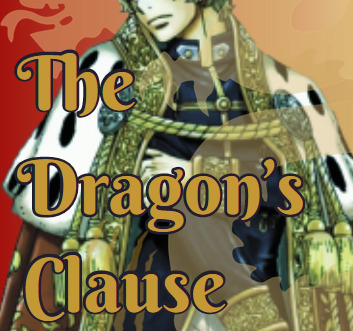

Chapter 1: A Review
The Empire of Nusjuro was one of five empires across all the realms that had been founded around the same time some eight hundred years prior. Each of the empires had within them several kingdoms. The Empires themselves offered protection to those kingdoms willing, and able, to pay them tribute.
A sign of deference and reverence.
Kingdoms unable or unwilling to pay the tribute often found themselves razed to the ground and struck from the records of history. The empire itself rarely even had to raise a hand, simply allowing other surrounding kingdoms to wipe the offending kingdom from the maps and records through their own greed.
Such actions struck you as foolish, when the lands beyond the borders of any given empire were rife with monsters. It seemed wiser to have more people focused on dealing with the abominations, than wasting resources and lives over foolish things like borders.
The foul beasts were born up from some source none could be sure of. It was agreed that the creatures were hardly natural in their creation, but despite the ferocity and danger of them, their existence was lucrative. Beasts from the wild were soaked in magic, so all parts of them held value, from their hides to the bones. There was a cost in pushing them back, but it was often off-set by the beasts’ own corpses.
Your own country of Lulusia was lucky enough to border lands with particularly useful beasts at its border. Coming out ahead with monsters was a mix of how difficult it was to deal with the beast, and how effective its remains could be processed. Lulusia made decent coin from its monster expeditions, though the neighboring kingdom of Goa struggled to break even on the costs of its own expeditions.
What Lulusia lacked, however, Goa had in spades, and so the two kingdoms had known prosperous trade and peace for some time. Lulusia’s king, your uncle, was good friends with Goa’s king, as the two had attended the academy in the kingdom of Germa back in their youth.
Germa was the academic center for the Nusjuro empire, and almost all nobility, and most assuredly all royalty, attended a year or more at the academy there. Less time was needed for those who had taken up academic studies prior to attendance, and more time was needed for those seeking to specialize in some variety of magic or academia.
Magic in this world was easily categorized into three sections: Basic magic, or cantrips as they were more commonly called, advanced magic, also known as restricted magic, and specialized magic. Cantrips were little more than ways to make one’s life easier, requiring almost no magic to conjure, and very little knowledge to command. Cantrips were useful for things like lighting stoves and campfires, donning and doffing armor used by knights, mending clothes, and helping road-weary travelers stay clean when there was neither an inn nor bath within easy reach.
Advanced magic required more magic, and with few exceptions, formal instruction of some variety. Advanced magic applications covered the gamut from teleportation magics, to destructive rains of fire, to defensive capabilities. Often one either dedicated their time to learning magic or the sword, though there were plenty of people well-practiced in both. Knights capable of wielding advanced magic were either Guardians, or Elemental Swords, depending on their specialization.
Guardians protected themselves and their charges with defensive spells, and Elemental Swords, or simply Swords, were often adept at a single element of magic, and incorporated it into their fighting style.
Your father had been a Sword, and a grandmaster at that. He had three elemental magics he was adept with, and had utilized that flexibility to be the best border knight that Lulusia had known for some generations. His capacity in that regard, and his decision to step down, had kept the small kingdom at peace despite concerns about a war of succession between him and his brother.
“Stay focused lil’ scale, you have a lot to cover during your travels.” You murmur to yourself, turning the page in the book you were currently working through.
Beyond advanced magic was specialized magic. It was difficult to learn specialized magic in a formal setting, and most people who had some sort of specialized magic had either discovered it by happy accident, or been naturally gifted toward it. Specialized magic ran the breadth and width of imagination, allowing the user to transform their own body, or effect the world around them. Some people could seemingly produce materials out of thin air, creating everything from strings to great forests, with minimal magic use and efficiencies far beyond what any known restricted spell could manage.
In some cases the only difference between were-beasts and specialists was the simple fact that specialists had more control over their transformations.
One of the most famous specialists was the Royal Mage of the Dawn Kingdom, who taught at Germa’s academy when his kingdom’s princes had attended. He was known only as The Phoenix, and you weren’t even sure what he looked like, his fiery, feathered form being the most well-known appearance of his.
The Dawn Kingdom had the largest northern border, and as such its military might was impressive compared to its size. Though the current stability within the kingdom was thanks to the adoption of a second prince, who specialized in fire magic to such a degree that people called him the Flame Emperor. A risky moniker, given how touchy the empire is regarding such things, but apparently it fit well enough that there hasn’t been any backlash regarding it.
It was possible, though not plausible, that there wasn’t anything the empire could do about it. Once a name like that caught on, it wouldn’t matter if the Dawn Kingdom attempted to quell it. Things like that had a life of their own.
You shake your head, you’re getting off task again.
The Dawn Kingdom’s problems weren’t yours. Your problem was specific, though maybe “problem” wasn’t so much the word as “predicament” was.
Things between Lulusia and Goa had been slowly deteriorating, and it had been decided between the Kings that a renewal of bonds between their nations was in order. King Seki’s daughter was ill, and he had refused to risk her health, either by land or by teleportation, which itself was a draining process. Seki’s only other child was his eldest son, the crown prince and heir apparent to Lulusia.
That left you.
As the daughter of the king’s brother, you were, by rights, a royal. As such you were afforded certain privileges, such as an education in magic and etiquette, and other more functional academic pursuits. In exchange for those privileges, however, many of your options were decided for you. As the only child of your father, you were forbidden from becoming a border knight, this would have been regardless of your gender, since noble bloodlines fell under the Covenant of the Celestial Dragons, or more commonly referred to as the Divine Clause.
It was a holy document, said to be thousands of years old, that named the bloodlines of the five elders, the twenty saints, and hundred valors. The founding bloodlines for the Empire, the Empire's prominent families, and the hundred kingdoms.
It was more like the sixty-seven kingdoms currently. The number had been in flux for as long as you were alive, and far before you, you were sure. Despite the stability the Empire seemed to promise, there was little more certain in the world than war between kingdoms.
The Divine Clause was one of several such concepts handed down from the Empires and their collective grip on the world. Your father hadn’t been a fan of the system as it was, and you had inherited at least a little of his disdain. You kept it tucked down, as much as you did many parts of yourself.
You’d kept your grades, grace, and martial skills hidden from your uncle, and cousins. You didn’t play the fool, but you’d been prudent to keep yourself below the bar of your kin. Royalty though you were, you weren’t foolish enough to think it would protect you. Your uncle might not have been cruel, but he would’ve burned you at the stake to protect his wealth and his children, of that you had little doubt.
Komane and Maneko had been friendly toward you when you were all children, but once Komane’s illness kept her inside more, and Maneko left for the academy, there had been a sort of neutral business affect to your interactions.
You weren’t surprised things had turned out this way, in all honesty.
With a sigh you return to your studies. You needed to review the interactions of Lulusia and Goa before your arrival. Information was going to be your only weapon until you were able to amass support directly for yourself, and you’d have to do that carefully. Like with your cousins, it wouldn’t be wise to outshine Goa’s crown prince before establishing yourself.
The major kingdoms of concern were your own Lulusia, which required little extra reading, you knew the ins and outs of your own home better than the king. Then Goa, which was your destination, and finally the Dawn Kingdom, which was entwined with Goa.
Lulusia and Dawn had almost no direct interaction with one another, but Goa and Dawn had established robust and lucrative trade routes, met regularly to make sure things were favorable for both kingdoms, and had several things in common.
One of the most notorious things they had in common were that neither kingdom’s crown prince was the biological heir of the current king. In the case of the Dawn Kingdom it had been an event of grandeur and celebration.
In Goa it had been awkward at best. Rumor had been that the King and Queen had intended to cow their son into compliance by adopting an heir apparent. Despite their actions and threats, the biological son hadn’t buckled to whatever demands they required, and they had no choice but to crown the adopted son.
Thus did Goa end up with a Grand Duke.
News regarding him was split down class lines so deeply it was hard to say which was truth. The commoners seemed to exalt and love the Grand Duke. Tasked with keeping the northern border safe, it was rumored that he did so almost single-handedly. The only person with a stronger flame than his was the crowned prince of the Dawn Kingdom.
Nobles, however, painted a far different tale. The Grand Duke was a monster with a soul of ice. Stone hard skin, and a grip of poison. A twisted and scarred man who hungered for the throne, and brought an unnatural chill into every event he attended.
Rumors of his desire for power ran the gamut of hysterical to blood-chillingly believable.
Both sets of rumors pushed the limits of possibility, since no one could guard miles upon miles of border by themselves, and if he was truly so cruel, he would’ve been imprisoned by the Empire on the request of his own kin. So while rumors were all you had, you couldn’t depend on them.
The Duke, however, wasn’t your concern. The crown prince was, and there wasn’t much to be said about him, good or ill. Your Uncle knew only good things concerning him, as his friend, the King of Goa, was not like to speak ill of his heir no matter what.
It was likely that your Uncle was aware of some flaw or failing within Goa’s crown prince and had no intention of handing over his daughter - regardless of the political power that could be gained from it. Otherwise he would’ve sent you with her, as her lady-in-waiting, and had you assure her health and well-being until she was married to the prince.
But, you knew you were effectively a sacrifice from the beginning, and truths among Kingdoms was finicky at best. You’d have to verify things before you could earnestly believe anything, but leaning back and observing were things you were well-practiced in.
#The Dragon's Clause#sabo the revolutionary#revolutionary sabo#sabo one piece#sabo#x reader#reader insert#Fantasy AU#Royal AU#mdni
37 notes
·
View notes
Text
SmartLess Podcast Welcomes Presidents Biden, Obama & Clinton

SMARTLESS’ UNITES PRESIDENTS BIDEN, OBAMA, AND CLINTON FOR HISTORIC PODCAST INTERVIEW
While one former president is in court defending himself against hush money payments to a porn star and to a Playboy playmate, three other Ex-POTUS's discuss gun violence, foreign relations, Biden’s re-election campaign, what they miss about being in office, the State of the economy, passing the baton Between Presidencies, and more on the Smartless podcast.
SmartLess hosts Will Arnett, Jason Bateman and Sean Hayes have brought together three U.S. Presidents, Joe Biden, Barack Obama, and Bill Clinton, for a historic podcast interview.
The momentous episode is available early on Amazon Music/Wondery+ here. It will be wherever podcasts are available on Monday, April 29.
The podcast interview was recorded in-person recently with the hosts and the Presidents in New York City.
SmartLess with Jason Bateman, Sean Hayes, and Will Arnett is a podcast that connects and unites people from all walks of life to learn about shared experiences through thoughtful dialogue and organic hilarity.
The award-winning podcast was launched in July 2020 and is consistently among the top five most listened-to podcasts monthly. Guests have included Bradley Cooper, Emma Stone, Don Cheadle, Larry David, Greta Gerwig, Idris Elba, Kristen Stewart, Pedro Pascal, Selena Gomez, and many more.
INTERVIEWS CLIPS AVAILABLE HERE:
Sean Hayes: Do you all miss something specific about holding office, obviously except for you because you’re in office, but do you guys miss something?
President Biden: I miss not having an office.
President Obama: Well, look, everybody talks about Air Force One.
Sean Hayes: Yeah, sure.
President Obama: Marine One. It’s pretty convenient, I won't lie. But I’ll tell you the thing I miss the most. Remember those music concerts I used to do at, you can basically invite anybody, and you have this concert and I mean we got you know Stevie Wonder, Paul McCartney.
Sean Hayes: Everybody will show up.
President Obama: They’ll show up. And they do these rehearsals the night before a lot of times and you can kinda sneak down and could just sit there and watch Mick Jagger practicing with BB King or something on a blues night. I do miss that.
President Clinton: I miss the fact that they don’t play a song when you walk in a room anymore.
Sean Hayes: We should’ve done that today.
President Clinton: I was lost for three weeks when I left office. But let me tell you something serious, this is one reason that I so badly want President Biden to be re-elected. What I really miss is the job. Not doing it, I'm glad, I believe in the two-term limit strongly, but what I learned was on the worst day, when nothing was going right, problems are everywhere, there was still something you could do that would make somebody's life better. There is no job like that on earth.
Sean Hayes: I love that.
Clinton: And I want somebody..
President Obama: Who appreciates it.
President Clinton: …that I trust to make the most of that every day. Cause they’ll be bad days no matter who gets elected. But he’ll get up and he’ll start thinking about that. And I think his opponent will be thinking about…
President Obama: Himself.
President Clinton: …yeah, who I can get even with, who I can send away. Joe Biden will make the best of the bad days.
Jason Bateman: And the team that you have assembled and your comfort with deferment. For me personally, I love leaders that have the confidence to hire those that they respect, that might make them a little nervous.
Will Arnett: And also not to think that you're the…
President Obama: That you’re the smartest guy…
Will Arnett: Yeah, that you’re gonna have every…. We had leaders like that in the middle part of the last century who were put into government by presidents of old, and they made a lot of decisions that they thought they were right about, and they were terrible people. And when that happens, when you think that you’ve got all the answers, is the moment you don’t.
Jason Bateman: Like Ron Klain, bringing us out of COVID. It’s just on and on and on, the way in which you’ve surrounded yourself with the absolute best this country has to offer.
President Biden: I made a commitment, having an administration that looks like America. I have more women in my cabinet, I’ve appointed more Black Circuit Court judges than every other president combined in American history. I’ve kept my commitment about putting a Black woman on the Supreme Court. I’ve had an opportunity to go out and get the best people - and by the way, I sometimes pick up the phone and ask these guys who they think are the best people. And I’m looking for people that most of all, not just are good, but care about what they’re doing.
Jason Bateman: Whereas the other guy is only hiring people that won’t talk back and that’s…
President Biden: Oh mine talk back.
CLIP 2 - Download Here
Sean Hayes: What are the issues coming up that people are focusing on that you believe are the wrong things, or they may be the right things, and what should they be focusing on?
President Biden: I think they should be focusing on a couple of things. Number one, we’re gonna, in the second term, God willing, we’re gonna make sure that we do something about gun violence in this country.
Will Arnett: Yes.
President Biden: The idea that we allow assault weapons to be sold, and magazines with 100 rounds, is just bizarre.
Will Arnett: Well, President Biden, I’m so glad to hear you say that because that was gonna be my other question. Which is, the Democrats never say we want to take your guns away.
President Biden: Absolutely not.
Will Arnett: You never said that, you said we gotta be smart about what’s going on.
Jason Bateman: You don’t need to kill a deer with an AR15.
Sean Hayes: Right.
President Biden: The Second Amendment, when I taught law school, the Second Amendment wasn’t absolute ever. You weren’t able to have a cannon when you were, you know, the liberty is ordered with the blood of patriots. I mean, it’s a bunch of crap.
This episode of Smartless will be available wherever you get your podcasts on Monday, April 29.
9 notes
·
View notes
Text

“I’ve lived in this woman’s skin for a long time now,” Sackhoff tells Empire in our world-exclusive The Mandalorian Season 3 issue. “One of the things that Jon and I focus on is where she is in the moment, what peppers her experience. Jon and Rick, every single day, defer to me, which is a crazy experience, to have these masters asking me what I feel.” Evolving from a solely voice role to a physical performance, it’s still the same Bo-Katan inside. “It respects the craft, and the years that I have put in,” says Sackhoff. “I really do know her – her pain is my pain. When she experiences something, I really feel it.”
And not just emotionally. While five different women donned Bo-Katan’s armour throughout the shooting of Season 3, some of the action moves still came down to Sackhoff. “If one person has a better skill-set than the other, well, that person needs to put the suit on that day,” she explains. “That being said, I have a wicked knee-slide. I’ve been practicing my knee-slides on my mum’s kitchen with dish rags since I was five years old, so when that knee-slide comes up, you’ll know: that’s me. There are holes in my suit because I had to do that so many times. I came home with so many bruises on my knees. But I love that. If I came home with bruises, it was a good day!” Get ready: the journey to Mandalore is going to be full of adventure.
19 notes
·
View notes
Text
Five Times Vongola Settimo retrieved corpses at his CEDEF counterpart’s behest, and one time he made one
1, 2, A Christening Gift, 4, 5, 1
“You know,” Fabio tut-tutted, “There are plenty of occasions for leaving corpses in the harbour and impersonating the revenant ghost of Daemon Spade, but my daughter’s christening is not one of them.”
“I would claim the contrary.” Spada stretched, catlike, all lithe muscle under lovingly tailored dark wool, though Fabio couldn’t fathom when he found the time to exercise when they were both swamped by the unending work of consolidating Vongola resources as international tensions rose. “Did I not swear to you, Don Vongola, that I would not see your children fall to weakness? What would be more fitting a gift for the youngest of your blood than a show of strength ere she grows into her own?”
“Besides, I did give you a set of toys.” He added as an afterthought.
“Spealing of which, where did you find a set of authentic seventeenth century dolls with their original costumes? Daniela thanks you for both presents, but I don’t.”
Fabio laughed at Spada’s expression, “Why the long face? I’m entitled to my griping when you make so much more work for me—these poor dockworkers deserve some compensation for having to put up with your dramatics.”
“You shouldn’t take such a conciliatory stance.” The other man frowned, “You are Don Vongola, and I am the External Consultant. We answer to no one, especially not to petty labourers for executing a traitor.”
A deep furrow lay upon his companion’s brow, pressed deep by the weight of their woes, and Fabio longed to smooth it away. He shook his head instead. “That may be so, but this is a new century, and a new age. Tradition runs strong in Sicily, but the Vongola must affirm them if they are to hold in the face of an influx of new ideas. It costs us nothing to thank our people for keeping to omertà, which binds us all, nor to remind them that we are all proud Sicilians, no matter our station.”
“Omertà.” Spada said contemplatively. “You do not refer to the secrecy of Flame, but to the law that justice comes only at the hands of the wronged, that it is not to those on high that one might look to for redress, for they are selfish and care only for their own gain. Yes. As a Sky, Don Vongola, your power lies in connection, thus you have seen what I have overlooked. I defer to your judgement in this.”
There the man went again. His CEDEF Commander, being yet more stereotypically a Mist than Ligurio, was unreasonably attached to the image he projected, and retreated into melodramatics the moment he felt his composure was threatened. Fabio would have felt offended by the lack of trust, had he not seen the extent to which Spada concealed himself in the face of others. He, at least, knew that the Mist was not the thirty-year-old he claimed to be.
“Well,” Fabio adjusted his monocle, “I’ll admit, it’s a bit more complicated in practice than in theory. How you do things matters. Mess up, and instead of making a show of benevolence, an apology becomes a sign of weakness, so you aren’t wrong, exactly, to want to play it safe.”
“While you would rather risk it?”
At Spada’s raised eyebrow, Fabio smirked and cracked his knuckles. “I am a venture capitalist. Just follow my lead. We’re going to buy these men a few rounds of drinks, and then you, my hapless second, will be getting drunk.”
“You are a ridiculous man, Don Vongola.” Spada straightened from his slump and scrubbed a hand over his face, all pretence of needing Fabio’s support to stumble along gone with the drunken blush on his cheeks, now that they were out of sight of the pub, “I don’t see why you needed to bring my love life into it.”
They had first repossessed the corpse and sent it off to be dumped in front of the church steps, after which they had engaged in multiple rounds of socializing under Fabio’s lead, to Spada’s chagrin, only disentangling themselves after the stars had come out.
“Was I right, though?” Fabio asked, as they rounded a corner, falling into step with one another, “Have you already given your heart to another?” His attention was already on his companion, so he caught Spada’s aborted gesture towards his watch pocket, as well as the grief in the tight line of his mouth.
“I have—had—have.” Spada said, his eyes set far away. “She is dead now.”
“What was her name?”
“El—her name is not important.” The other man turned on Fabio, his gaze hollow and dark in the dim gloaming. “What must be remembered is that I failed, and she paid the price for my weakness—for Vongola’s weakness. It is in her name and for her memory that I have sworn never again to abide a feeble hand or hesitant heart in the Vongola.”
“She must have been a noble soul indeed, for you to love her so deeply.” He meant it.
On an impulse—perhaps the alcohol had affected him more deeply than he thought—Fabio clasped his counterpart’s gloved hand in his own, Intuition screaming that they were walking along the edge of a precipice—but his next words came naturally, easily, inevitably. “Never again, I promise you. Between the two of us, we will make the Vongola strong enough to protect those we love.”
“I hear you.” Spada replied, a fond twist to his lips, “Did I not offer oath already, Vongola Settimo? With this Ring,” He tapped the ring where it sat on Fabio’s right hand, “Passed from me to you, given in support? It has been four years thence, and I have had no cause to regret it. Your Flame may be weak, but your resolve is strong, and a general needs not take the field when he has a champion such as I. I have witnessed the Vongola flourish under your lead, I say to you, you are worthy of the name.”
I am. It was something Fabio had always known, and yet he never believed those words so deeply as when he heard Spada utter them.
“Then this I say to you, my sword.” Spada’s hand was steady beneath his own. “You were wrong when you said that we answer to no one. Though together we do not answer to any higher power, we are accountable to each other. I trust you, because you trust me. And together we are all the stronger for it.”
Was that—? For a moment, Fabio thought that he glimpsed a flash of sapphire, but Spada’s hair was as light as always, albeit mussed from the evening of drinking, and his eyes were steely blue-grey.
“Together we are all the stronger for it.” His sword repeated, and finally, they let go of each other’s hands.
Night had fallen. But darkness was their dominion. They walked, fearless, into it.
Daemon: Indeed, I am impersonating Daemon Spade (don’t date my gifts too closely, they most certainly weren’t the toy soldiers and dolls Elena and I were planning to give out own children)
Or, Fabio is unknowingly poking at all of Daemon Spade’s Giotto-related neuroses to the point that he lost control of his appearance even as Spada is soothing all of Fabio’s insecurities from having weak Flames.
next
0 notes
Text
Compassion and Deference Rarely Mix Well...
by Don Hall
Real-world ethics question: In a well-used city park, a man with a history of erratic behavior attacks a dog and its owner with a stick; five days later, the dog dies. The man is Black, the dog owner white; the adjoining neighborhood is famously progressive, often critical of the police and jail system. At the same time, crime is up in the neighborhood, with attacks by emotionally disturbed people around the city putting some residents on edge.
In a dog-loving, progressive enclave, where pushing law and order can clash with calls for social justice, what’s the right thing to do? How do you protect the public without furthering injustice against this man?
SOURCE
As we all do our level best to progress through progress, thorny issues are certainly going to pop up and challenge the narratives (rather than facts or truth) we adhere to with such quasi-religious belief. This is not one of them. Nothing thorny about this nor is acquiescing to the most idiotic of feeble minded perspectives required.
Issues are always more complicated than they seem at first blush. In the immediate reaction to Amy Cooper calling the cops on the black birdwatcher, it seemed that obvious racism was present but if you bothered to dig just a few inches beneath the headlines, it was almost nothing like the white vs black narrative presented. The birdwatcher had a history of antagonizing dog owners, threatened her in a section of the park where she was isolated, and she called the cops on him with a crappy signal that required her to repeat herself.
In this case, it really is pretty simple even with the complexities. Black man with known mental issues and a history of threatening violence to passers-by strikes out at white woman and her dog while ranting about immigrants in the park. He hits the dog hard to severely injure the dog. The dog dies. The fact that she's white and he's black has fuck-all to do with the killing of the dog, right?
I find a strange kind of switch going on with the Edgecase Left lately. Watching the Season 2 premiere of The Problem with Jon Stewart I hear Jon and others suggest that children are developed and smart enough to determine their own genders and therefore must be treated as functioning adults while those focusing on race seem to insist that black American adults are simply too simple-minded to be held accountable for their own actions because of racism as if if racism rendered poor blacks into childlike creatures unable to decipher the complexities of right and wrong.
Sure, the man in the park is mentally ill and an obvious danger to anyone around him. Certainly, his tirade about immigrants taking over the park is deranged and racist. Absolutely, he killed a woman's dog for no reason whatsoever. But he's black and thus, due to slavery and Jim Crow, he isn't to be held accountable because he just can't help himself and white people are just awful. What a crock of shit.
The compassionate thing for Jon Stewart's gender dysmorphic children is to provide counseling, give the children a place to experiment with gender without altering their bodies, work with the parents to give them gender affirming strategies, and promote the basic dignity of all humans to the mainstream community. Deference to children is not compassionate nor is it pragmatic. Kids have neither the capacity to understand what permanence feels like nor the maturity to effectively deal with what is, at least in current medical parlance, a mental health issue. Gender dysphoria is not a fad but a genuine condition but not one to be taken at face value anymore than a kid who decides to become a world record holder for wearing roller skates without actually knowing what the record he's challenging is in the first place.
The compassionate approach to the mentally unstable black dog killer is not to excuse his behavior by posing a faux ethical dilemma but to fund and require medical intervention for all homeless with mental health issues with little to no regard for race. Rather than throwing up our hands and accepting crime as a natural byproduct of a lack of resources and, you know, whiteness, perhaps working to provide those resources is more compassionate and pragmatic.
If the black mutt eradicator is not to blame for his actions due to cultural issues then neither are the poor white racists in Alabama. Cultural issues as an excuse for violent behavior is the ultimate moral relativism and facetiously exonerates everyone from being held accountable for crimes against one another.
Let's approach the real world ethics question this way:
An Asian homeless man, known to be mentally unstable and frequently threatening, is seen howling about immigrants taking over the park. A Pakistani woman tries to move past him, he hits her and then hits her dog, mortally wounding the dog. The ethics dilemma is gone. Arrest that fucker or at least get him off the streets and into some sort of programmed rehab or treatment center. No question. Deference to him is the least compassionate thing we can do. If the man needs help, allowing him to continue menacing park-goers is simply avoiding giving him assistance because assistance requires a bit more skin in the game.
Another real world ethics question:
A black homeless man is rummaging through a dumpster and a white woman with a rabid, rabies-laden dog approaches. The dog attacks the man and he dies a few days later from the bites. Society loves dogs, right? Is there an ethical dilemma here? Not a chance. The dog gets put down, the woman gets arrested or fined for walking a dangerous animal around a city park, and the NYT will publish an opinion piece about white people’s dogs proliferation white supremacy.
For the same reason elevating the status of children to functioning adults in deference to some need to validate ideology it is likewise counterproductive to infantilize racial minorities as if they are simply too burdened by historical horrors to know the difference between good and evil. The mentally ill need help not deference.
1 note
·
View note
Link
0 notes
Link
Elevated Outlook & Centrally Located
0 notes
Photo

“‘Window Cleaner’ Gets 3-Year Term,” Toronto Star. May 25, 1932. Page 2.
----
Stole $2,000 Worth of Jewelry From Customers, Wouldn’t Help Recover Loot
----
Frank Wynd alias Delaney, pseudo window cleaner, [PICTURED] was convicted in police court to-day of theft of a considerable quantity of jewelry from houses he had worked in.
Mrs. M. Meaden and other ladies identified accused as having visited their homes and also testified how diamond rings, watches, jewelry, and other valuables had vanished.
In one instance $7 was missing from a maid’s purse in a house where he had ‘worked.’
Five charges resulted in convictions and two were deferred, as complainants were ill, and unable to attend.
Detective Silverthorne said accused failed to assist them to recover the stolen property. Mrs. Meaden’s unrecovered jewelry alone was worth $400. In all the jewelry not recovered was worth about $2,000.
The bench then sentenced the accused to three years on each charge in Kingston penitentiary; sentences to run concurrently.
Railroad police were active on Victoria Day and 21 trespassers on C.P.R. and C.N.R. property appeared in the police court to-day.
Mike Cusick from Calgary was fined $10 or three days; Thomas Plumtree and John Fitzgerald for crossing the tracks in North Toronto $10 or 10 days; Stanley Melling and Fred Douglas, boys on the line at North Toronto depot, $2.00 or 10 days Thomas Lawas and Harry Dunahie, sleeping box cars at the Don yards, $10 or five days; Stanley Pyzik, Hon Tulko, Joe Guco, and John Matick, waiting for a train at the C.N.R. Spadina yards, $10 or five days.
Arrivals by freight train from points west at 11 p.m., yesterday; James Thompson, Fred Turner, Sutton Baker and Ronald Jones were remanded in custody till May 28 for a clean-up. James Fitzgerald on C.P.R. property for an unknown reason was fined $10 or 10 days. Found in the Bathurst St. yards, Monty Jayownkis, Hungarian, was fined $10 or 10 days; his two companions, Phillip Setenstein and Edmund Jones, were remanded in custody for a week for a clean-up.
Found wandering in a lane, G. Barker, a well-dressed young man, was remanded at the request of the police till June 4. His bail was set at $200.
Trespassed at Track
Patrick Adams pleaded not guilty to trespass on the wholly enclosed premises of the Ontario Jockey Club, to wit, the Woodine race track.
‘I saw him on Queen St. and then he hopped over the fence to the track,’ swore a witness.
‘He was in the stables, I caught him as he was making his way to the public lawn,’ swore a second.
Accused produced an admission card which it was alleged he picked up.
‘How many times have you been put off that track? You know you are not wanted there. This time I will fine you $10 or 10 days,’ ruled the magistrate.
The only Victoria Day celebrant out of a list of ten to be fined was Charles MacDonald who was assessed $50 or a month.
Six Days For Theft
Harry Fortnum, convicted of theft last week, was sent to jail for 60 days. The accused stole some jewelry and claimed he had been drinking when he did so.
When they had pleaded guilty to stealing three pairs of stockings from a department store. Joseph Davis and Frank Stickler, were sent to jail for ten days each.
David Ramsay, married with a family of children, took some clothes from the same store; he was given a ten-day term.
Gave Himself Up
Off a farm at Whitby the conscience of William Wilcox bothered him because he stole a bicycle last year, so he walked into the police station and ave himself up.
‘And how did you get to Toronto, ride the bumpers?’ asked the crown. ‘Yes, sir, I have been riding them all winter.’
The bench remanded accused for sentence and told him to go back to Whitby and stay there.
William Scott, who appeared in his shirt sleeves, and who also confessed to stealing a bicycle, was given a chance on probation for one year.
The vigilance of P.C. Brown (200) was ordered brought to the attention of the police commissioners and Edward Taylor and and George Bray were each sent to the Ontario reformatory for 18 months definite and six months indefinite, following their conviction on a charge of attempted shopbreaking.
Officer Brown spotted the accused in a lane on Church St. where they were manipulating the back door of a Chinese restaurant. In a statement Bray said he had gone to act ‘as lookout’ for Taylor, who wanted to get some money as he had a bill to pay.
Jack Silk, charged with receiving a diamond ring, stolen by the convicted man, Frank Wynd, pleaded guilty. Accused said he sold the ring for Wynd in a second-hand jewelry store for $10. After his arrest he told the police where the ring was.
Accused acknowledged four previous convictions.
He said he got $2 as his share of the proceeds of the ring sale and was now out a work: he had been working at Camp Borden.
‘You may know where the rest of that jewelry is,’ remarked the bench. ‘You will be remanded in custody for sentence for a week: perhaps your memory will revive in the interim.’
Has Dice in Court
Convicted of theft and fraud Roland Teale who has already been in jail for 11 days was to-day placed on probation for six months and ordered to pay back certain money derived as a result of his activities from a military organization that was holding a reunion.
W. B. Horkins gave a demonstration in court to-day of the methods of playing the ancient game of crown and anchor, this being in the course of his defence of Raphael Cheavaini and Alex Carmach, alleged operators thereof.
Two boars and two sets of dice were produced in court, but counsel urged that Carmach was merely a player but not an operator.
Cheavaini was fined $50 and his boards ordered confiscated and Carmach was given the benefit of the doubt introduced by counsel and discharged.
[AL: Wynd or Delaney was 31 at the time of conviction, an electrician ostensibly, married, a Presbyterian, and had no apparent criminal record. He was convict #2680 at Kingston Penitentiary, and worked in the electrician’s gang. In July 1932 he was transferred to Collin’s Bay Penitentiary, becoming convict #426, but was returned October 24, 1932, as convict #2823, apparently for supporting a strike there in solidarity with the Kingston Penitentiary riots that month. He was a troublemaker for much of 1933, but was eventually put in an outside work gang. He was released December 1934. He would be back again in 1941 and as late as 1956, his method of operation - according to his RCMP file - being the same as in 1932: posing as a window cleaner and rifling homes.]
#toronto#police court#window cleaner#theft#stolen jewelry#jewelry theft#jewel thief#criminal aliases#trespassing#vagrancy#criminalizing vagrancy#the vagrant as criminal#riding the rails#transients#shopbreaking#shopbreakers#sentenced to the penitentiary#kingston penitentiary#sentenced to prison#ontario reformatory#fines or jail#illegal gambling#history of crime and punishment in canada#crime and punishment in canada#great depression in canada
0 notes
Text
Press/Gallery: How Elizabeth Olsen Brought Marvel From Mainstream to Prestige
“The thing I love about being an actor is to fully work with someone and try so hard to be at every level with them, chasing whatever it is you need or want from them.”





GALLERY LINKS
Studio Photoshoots > 2021 > Session 008
Magazine Scans > 2021 > Backstage (August 19)
Backstage: Elizabeth Olsen grins widely over video chat when recalling many such moments on set with her co-stars. Yet, she can’t bring herself to divorce such a lofty vision of film acting from the technical multitasking it requires. The camera sees all.
“But then you move your hair, and you’re in your brain, like: OK, remember that! Because I don’t want to edit myself out of a shot. I know some actors are like, ‘Continuity, shmontinuity!’ But the good thing about continuity is, if you remember it, you’re actually providing yourself with more options for the edit.”
That need to balance being both inside the scene and outside of it, fully living it and yet constantly visualizing it on a screen, feels particularly apt in light of Olsen’s most recent project, “WandaVision.”
The mysteries at the heart of the show grow with every episode, each fast-forwarding to a different decade: Could this 1950s, black-and-white, “filmed in front of a studio audience” newlyweds bit be a grief-stricken dream? Might this ’70s spoof be a powerful spell gone awry? Could this meta take on mockumentary comedies be proof that the multiverse is finally coming to the Marvel Cinematic Universe?
The series’ structure, which branches out to include government agents intent on finding out why Westview has seemingly disappeared, calls for the entire cast to play with a mix of genres, balancing a shape-shifting tone that culminates in an epic, MCU-style conclusion. What’s key—and why the show struck a chord with audiences during its nine-episode run—is the miniseries’ commitment to grounding its initial kooky setups and its later special effects-driven spectacle in heartbreaking emotional truths. It’s no small feat, though it’s one that can often be taken for granted.
“I was thinking how hard it would have been to have shot the first ‘Lord of the Rings,’ ” Olsen muses. “Like, you’re putting all these actors [into the frame] later and at all these different levels. All the eyelines are completely unnatural. And yet the performances are fantastic! And technically, they are so hard. People forget sometimes that these things are really technically hard to shoot. And if you are moved by their performance, that took a lot of multitasking.”
As someone who has learned plenty about harnesses, wirework, fight choreography, and green screens (she’s starred in four Marvel movies, including the box office megahit “Avengers: Endgame,” after all), Olsen knows how hard it can be to wrap one’s brain around the work needed to pull off those big, splashy scenes.
“If you think about it, it’s, like, the biggest stakes in the entire world—every time. And that feels silly to act over and over again, especially when people are in silly costumes and the love of your life is purple and sparkly, and every time you kiss them, you have to worry about getting it on your hands. Those things are ridiculous. You feel ridiculous. So there is a part of your brain that has to shovel that away and just look into someone’s eyeballs—and sometimes, they don’t even have eyeballs!”
The ability to spend so much time with Wanda, albeit in the guise of sitcom parodies, was a welcome opportunity for Olsen. Not only did it allow the actor to really wrestle with the traumatic backstory that has long defined the character in the MCU, but having the chance to calibrate a performance that functions on so many different levels was a thrilling challenge.
“It was such an amazing work experience,” she says. “Kathryn [Hahn] uses the word ‘profound’—which is so sweet, because it is Marvel, and people, you know, don’t think of those experiences as profound when they watch them. But it really was such a special crew that [director] Matt Shakman and [creator] Jac Schaeffer created. It was a really healthy working environment.”
Related‘WandaVision’ Star Kathryn Hahn’s Secret to Building a Scene-Stealing Performance
‘WandaVision’ Star Kathryn Hahn’s Secret to Building a Scene-Stealing Performance
Considering that the miniseries spans several sitcom iterations, various layers of televisual reality, and a number of character reveals that needed to feel truthful and impactful in equal measure, Shakman’s decision to work closely with his actors ahead of shooting was key.
“We truly had a gorgeous amount of time together before we started filming,” Olsen remembers. “Our goal was—which is controversial in TV land—that if you wanted to change [anything], like dialogue in a scene, you had to give those notes a week before we even got there. Because sometimes you get to set, and someone had a brilliant idea while they were sleeping, and you’re like, ‘We don’t have an hour to talk about this. We have seven pages to shoot.’ And so, we were all on the same page with one another, knowing what we were shooting ahead of time.
“Matt just treated us like a troupe of actors who were about to do some regional theater shit,” she adds with a smile.
That spirit of camaraderie was, not coincidentally, at the heart of Olsen’s breakout project, Sean Durkin’s 2011 indie sensation “Martha Marcy May Marlene.” As an introduction to the process of filmmaking to a young stage-trained actor, Durkin’s quietly devastating drama was a dream—and an invaluable learning opportunity.
“It was truly just a bunch of people who loved the script, who just were doing the work. I didn’t understand lenses, so I just did the same thing all the time. I never knew if the camera would be on me or not. There was just so much purity in that experience, and you only have that once.”
The film announced Olsen as a talent to watch: a keen-eyed performer capable of deploying a stilted physicality and clipped delivery, which she used to conjure up a wounded girl learning how to shake off her time spent in a cult in upstate New York. But Olsen admits that it took her a while to figure out how to navigate her career choices afterward. In the years following “Martha,” she felt compelled to try on everything: a horror flick here, a high-profile remake there, a period piece here, an action movie there. It wasn’t until she starred in neo-Western thriller “Wind River” (alongside fellow Marvel regular Jeremy Renner) and the dark comedy “Ingrid Goes West” (opposite a deliciously deranged Aubrey Plaza) that Olsen found her groove.
“It was at that point, when I was five years into working, where I was like, Ah, I know how I want it. I know what I need from these people—from who’s involved, from producers, from directors, from the character, from the script—in order to trust that it’s going to be a fruitful experience.”
As Olsen looks back on her first decade as a working actor, she points out how far removed she is from that young girl who broke out in “Martha Marcy May Marlene.”
“I feel like a totally different person. I don’t know if everyone who’s in their early 30s feels like their early 20s self is a totally different human. But when I think about that version of myself, it feels like a long time ago; there’s a lot learned in a decade.”
Those early years were marked by a self-effacing humility that often led Olsen to defer to others when it came to key decisions about the characters she was playing. But she now feels emboldened to not only stand up for herself and her choices but for others on her sets as well.
“[Facebook Watch series] ‘Sorry for Your Loss’ I got to produce, and I really found my voice in a collaborative leadership way. And with ‘WandaVision,’ Paul [Bettany] and I really took on that feeling, as well—especially since we were introducing new characters to Marvel and wanted [those actors] to feel protected and helped,” she says. “They could ask questions and make sure they felt like they had all the things they needed because sometimes you don’t even know what you need to ask.”
It’s a lesson she learned working with filmmaker Marc Abraham on the Hank Williams biopic “I Saw the Light,” and she’s carried it with her ever since. “I really want it to feel like we’re all in this together, as a team,” Olsen says. “That was part of ‘Sorry for Your Loss’ and it was part of ‘WandaVision,’ and I hope to continue that kind of energy because those have been some of the healthiest work experiences I’ve had.”
If Olsen sounds particularly zealous about the importance of a comfortable, working set, it is because she’s well aware that therein lies an integral part of the work and the process. As an actor, she wants to feel protected and nurtured by those around her, whether she’s reacting to a telling, quiet line of dialogue about grief or donning her iconic Scarlet Witch outfit during a magic-filled mid-air action sequence.
“Sometimes you’re going to be foolish, you know? And [you need to] feel brave to be foolish. Sometimes people feel embarrassed on set and snap. But if you’re in a place where people feel like they’re allowed to be an idiot,” she says, “you’re going to feel better about being an idiot.”
This story originally appeared in the Aug. 19 issue of Backstage Magazine. Subscribe here.
Press/Gallery: How Elizabeth Olsen Brought Marvel From Mainstream to Prestige was originally published on Elizabeth Olsen Source • Your source for everything Elizabeth Olsen
#Elizabeth Olsen#WandaVision#Avengers#Scarlet Witch#Wanda Maximoff#Sorry For Your Loss#Avengers Infinity War#Avengers Age of Ultron#Captain America Civil War#Ingrid Goes West#Godzilla#Doctor Strange in the Multiverse of Madness#Marvel#MCU#Candy Montgomery#Love and Death#Avengers Endgame
48 notes
·
View notes
Text
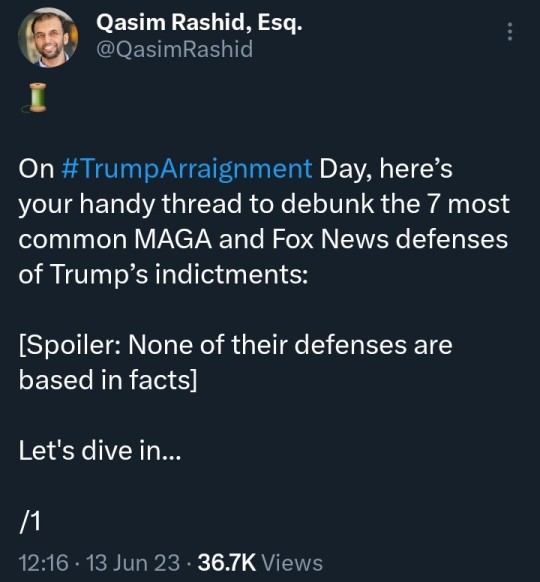
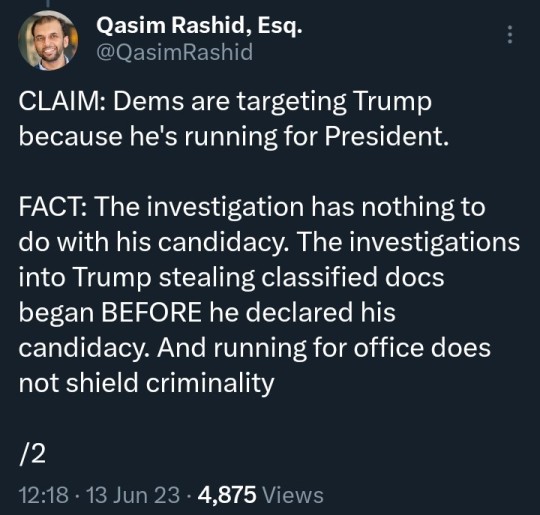

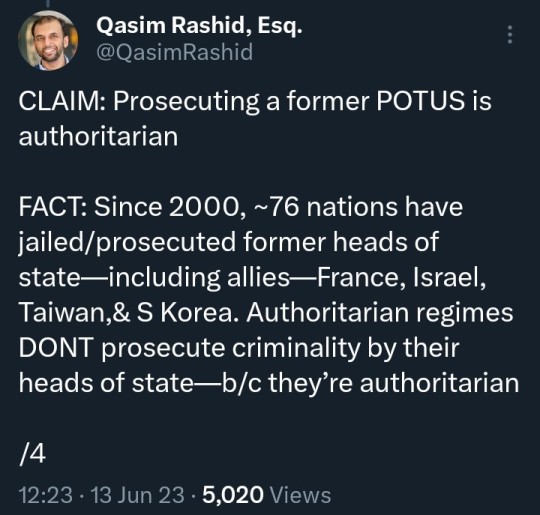





#Qasim Rashid#ManChildTrump#Donald Trump#Trump#Drumpf#CrybabyTrump#Tiny Hands#Limp Dick#Spanky#Pee Brain#Cadet Bone Spurs#Five Deferment Don#The Orange Menace#The Manchurian Cantaloupe#classified#documents#cover up#obstruction#indict#indictment#espionage#justice#criminal#MAGA
5K notes
·
View notes
Text
intermission: second-year sadness
November 20th, 2020, I am told, was the last day students were allowed to remain on campus last fall. The justification for this ridiculous, premature dismissal was that it was the first year of the pandemic, and now that we are well into the second I am able to say that it fits comfortably within the literary canon of sorrow we've found ourselves locked in, by which I mean: all right, we were all scared shitless, we all wanted to keep living. But suppose you were one of those students who, having been here for barely ten weeks, was asked, abruptly, to leave; suppose you were a freshman. Freshman fall turned summer camp. Your suitcase as heavy on the flight back as it was on the one over. Every dorm room vacated after two and a half months. Everything thrown away. Suppose your first memory of college was walking along a narrow plank and not knowing when you would be dropped into the sea.
winter break, I am told, was a hoarse, dry-mouthed affair. The dining hall opened at stuttering, inconsistent hours throughout December so people often ran hungry and cold and confused, and the number of students who had fought and fought and stayed was so few to begin with, what had been a ghost town of a campus to begin with lost its ghosts to a deep-seated sorrow and sunk into the snow. According to my friends who were here before I was, last fall was a murder and winter was a haunting and then spring came for all of us, smiling and smiling with a mouth full of flowers, but we were still lying on the ground, waiting for someone to rescue us from our loneliness. Spring stood in front of the boneless hope that had sustained us for the last six months and it cringed so hard its teeth fell out. And we still didn't get up.
the freshmen class this year is the biggest we've had in ages. I'm unclear on the details but I know one of the reasons this has happened is because of all the should-have-been-sophomores who made the smart choice in the face of a terrifying and untouchable enemy and deferred their enrollment for a year. Then there are all the gaps, the semesters and years taken off to mourn and sort bookshelves in quaint second-hand bookstores and cry into loaves of sourdough bread. The question is no longer which class year are you from but rather what do you remember? Have you ever stepped into the building they keep the philosophy department and its creepy blank-eyed statue of a man who looks vaguely Chinese but I have never taken a proper look at out of fear and respect and fear chained in? Have you ever held a plate in the dining hall?
I bumped into a friend due to graduate at the end of the fall in the library the other day. He injured his knee while playing tennis and is now waiting around for the surgery that will put it back together, working on his thesis and puttering around in his studio in the hours in between. He's been here for a while. He remembers freshman orientation, his shitfaced roommate bringing someone back to their room without asking, what the library looked like during finals season. When I see him around campus, which isn't often, it's hard to keep track of people now when there are more than five in my line of sight, another unexpected side-effect of the pandemic, he looks at home. Like he knows what he's doing, even if he doesn't know what he's doing. He knows what he's doing. He has a reference point for college life that isn't made of smoke and mirrors, and I imagine that to him this, all this, is nothing more than a returning. Some kind of coming home. Like walking into your old bedroom and finding your collection of empty coke bottles right where you left it fourteen years ago, beside the Peter Pan poster with the pasta sauce stain and your favorite stuffed camel.
and just like that, another November. This year Thanksgiving break will end with all of us back where we started, in our too-small dorm rooms with our shitty roommates and our unswept floors and the bathrooms bursting with the sound of people we don't know throwing up at four twenty-seven in the morning and missing the sink. It's not the same old song because it's the first time we've ever sung it. We're not very good at singing and we're not sure where we're going. But the ground is firm and tough beneath our feet and the air is cold and sharp.
standing on the top of the hill with our second-year sadness and our suitcases, our throats scratchy with sun, we are overcome, for a moment, with the urge to start running.
11.24.21
15 notes
·
View notes
Text
humility.
Summary: Alex begins to see the bigger picture.
Word count: idk I wrote this in like an hour lol
Author’s notes: Happy birthday to Alex! I wanted to make a very quick piece with these two developing in the background to commemorate the occasion!
“Hey- hey, c’mon, no-... I thought you were trained better than this! You can’t have my drink, d- don’t be all... j- just, don’t be like this, buddy--”
That pitbull sure are rowdy today; maybe they just knew I’d be here, spending time with their owner. One of them, at least - he didn’t text me to say that he wouldn’t be in until later that day. Sure, it’s about twenty minutes away, he’ll probably arrive in five, and I’ve got Bernard here to accompany me until then, but... even that comes with the knowledge that Theo is probably skulking around in the back. I guess this will do, though. A dog’s a dog, I can’t control who his owner is, or what he’s like.
I’m more than happy to sit here with my hot chocolate, gently letting him down so that he doesn’t end up poisoning himself. It’s crossed my mind once or twice, in brief moments of anger - but I think that’s just the Gale in me being a little extreme. Like I said, a dog’s a dog. And, hey, he’s a cute little pitbull, too. At least he likes me.
In the same instant my free hand reaches out towards him - the prosthetic one, I should note, which is probably a bad call on my part, but I just can’t get enough of the warmth of the mug on my hand - he seems to plod away, distracted. What could be more interesting right now? There’s only one other person here, do they have a chew toy or somethi-
... oh. Right.
I realise the moment he steps out and enters my field of view from behind the counter; that ostentatious red letterman of his with those black jeans gently dusted with flour. His white shirt hides those stains better, for sure. Of course he’s the only other person that dog would defer to - brushing past his hand for a gentle pet to his head.
I swear, the sigh I feel myself let out is heavier than a black hole; at least I’m used to the words we share being just as crushing to our patience.
“What do you want, Theo?”
No reply - not at first. If he wanted to get my attention, he’s got it; what on this good green earth could get a loudmouth like him choked up? I push myself a bit past my comfort zone, just out of the curiosity it brings. His face looks... well, there’s one expression I do know. His lip is puckered, his single visible brow furrowed in uncertainty. He sucks in a deep breath - drawing a hand from behind his back, and from it...
A new plate - donning a thick slice of cake. I can smell the sweetness of it from here; white chocolate, and strawberries. He’s even put little white chocolate shavings on top, alongside the fresh strawberries.
“Uh...” I can’t help but be lost for words; what’s he trying to do? Does he think he can just gift his way to forgiveness? If that’s the case, I’d be glad to let him keep on giving - I’m not gonna be swayed by that superficial bullshit. I blink, raise my brows - not out of confusion, but as though to ask; you really thought this would make things better?
“Just... wanted to wish you a happy birthday.” he says at last. “You’re twenty-four now?”
“... yeah.” I don’t make any move to reach for his offering; my fingers, freed from the mug I was so gently holding before, drum against the table top.
I hear him sigh the moment I look away - watch him step a bit closer in my peripheral vision. My eyes stay away from him, utterly fixated on the gentle sway of the liquid in my cup.
“Look,” he huffs. “I know this isn’t the day to bring up shit. I just-... wish this happened less.”
“The feeling’s mutual,” I reply. “But I guess I’m not gonna catch a break from you.”
“I don’t mean that,” he rushes to clarify his own semantics. “I just... I know I can’t take back what I did to you. Same goes for you.” On a worse scale, I admit to myself, but go on. “But I also know that I don’t wanna be your enemy for as long as we’re around each other.”
“And what?” I scoff - finally turning to face him in that one eye that stares me down so intently. “I already know you can’t forgive me. And... I- I’ve made peace with that. And- and you know I can’t forgive you for-”
“Forgiveness isn’t the point,” he cuts me off - for once, I can only hear pain lacing his assertion. “It’s just... we’re not kids, Alex. I just wish we’d stop acting like them.”
Is he trying to insult me now?! Trying to insinuate that, despite everything I’ve been through, I’m still the same kid I was before? Everything we’ve put each other through, everything I’ve been through that he wasn’t there to see–
... everything he’s been through, that I wasn’t there to see.
Oh, God, is this what he means?
“Listen,” he speaks through my pause. “I know I can say sorry as much as I want and it won’t mean shit. We’re past that, I know. But... we both know Souji’s sick of this. Somethin’ tells me, just... sooner or later, both of us are gonna be, too. Shit’s gonna turn into a fuckin’... Motague and Capulet situation, you feel me?”
He always did like his theatre. I wonder if he feels good about himself for drawing comparisons to it, scholar that he is.
“Maybe,” I huff, eyes still staring into that hot chocolate. “But... look. You were right about one thing. This isn’t the day to bring this up. I’m... I’m not in the mood for this. I’m in a good mood... and I wanna keep it that way. So, if you don’t mind...”
There’s probably a million more harsh ways I could tell him to leave me alone on my birthday, to tell him that I don’t have to - don’t want to put up with this from him today of all days. My eyes just end up drifting away again, back to the hot chocolate waiting patiently for me to meet it again.
“Well, uh... I’ve said what I wanted to say.” he concedes. “Uh-... and I made that cake special for ya. The hot chocolate, too.”
... wait, really?
“But, uh... yeah. I guess we’ll... save that for some other time.” He stands up again, taking his steps past the counter - pausing for one last comment. “Happy birthday, Alex. Have a good one.”
Well, that was... weirdly candid of him. I can’t help but feel like he’s just mellowing out because of what day it is; any other day, we’d be wasting no time just pretending the other’s not here, but... he actually approached me this time.
... maybe I am just a child. Maybe I’ve overestimated my own growth. Maybe things aren’t as far-gone as I imagined they’ve always been. Maybe one of these years, I’m due to change.
... come on, Souji. Don’t leave me alone with that stewing in my head too long, will you?
#[ᴘʀᴏɢʀᴀᴍᴍᴇᴅ ᴛᴏ ᴡᴏʀᴋ ᴀɴᴅ ɴᴏᴛ ᴛᴏ ғᴇᴇʟ] IC#Drabbles;;#{ this... went in something of a different direction than i anticipated! }#{ but it also touches on an arc for the two of them that i wanna get into }#{ so that was fun! }#{ either way i had a lotta fun writing it! }#{ i do like how alex's anger is like }#{ now less outburst-ish than it was thanks to therapy }#{ but instead she takes on a kind of childish spite }#{ and it REALLY shines through when she interacts with Theo }#Theo;; IC
8 notes
·
View notes
Text
First Line(s) Game
Rules: List the first lines of the last ten (10) stories you published. Look to see any patterns you notice yourself, and if anyone else notices any. Then tag some people.
Tagged broadly by @murderlight, whose stories got me into writing bleach fics and reinvigorated my interest in writing, so I'm curious to see how my first lines have been. Before and after everything.
-----
1. His Violent Delight
What was madness, if not an answer of what you ought but haven’t questioned, if not a query to excite him — the very hollow who had asked — but would never find an answer, though the answer was himself.
What was madness, if not destruction nor the copper behind a lip, if not music — an orchestra — a hint of metal and dirty teeth that were grinding, growling and gnashing, but for what.
2. On the Night You Said, "I Loved You"
Was there anything so undoing that once you found it, you wished you didn’t?
Like a secret behind a cupboard where the locks were fortified, or the only window in an orphanage where the sunlight couldn’t touch. Chained and boarded up — at least, the reasons as to why were readily available if you were curious enough to ask.
But he hadn’t. Damn permission. Tom trifled, pushed his luck, and what he found beyond the door — beyond the window — was disappointment.
3. Hour [5:43]
Once upon a time, it was five forty-three. A.M., ante meridiem — ‘before noon’ as some would call it, or as Google would soon reply if you found yourself staring at this and were wondering what it meant. That once you found it, you thought, ‘no shit’ because the sun was still asleep. But then you wondered what was the difference between now and …seven thirty.
They were both ante meridiem; they were both before twelve. They were not after noon, but were as different as night and day. Because seven thirty had the sun while the other had fucking nothing.
4. Portrait of an Orange and Two Halves
That evening, that night, before the sunset and burning bright, before the world as he knew it became a moment most divine, he caught a glimpse of his husband as said husband was asleep. Tilting farther and farther and farther to his left as if waiting for a shoulder, or meeting it while he dreamed of all the dreams he couldn’t shoulder if there wasn’t one beside his ear.
Or another for him to pillow before he crumbled to his notice. And hanging like an apple — like a leaf while in autumn — he was inches and a breath away from Getsu and his whiskers.
5. Stumbling Once We Found It
New Year’s had come and gone in the only way it knew how: in promises, goals, secrets and vows. That what tied these to a needle and stitched them to a scarf, or any other little present from the holidays you might’ve got, was a question with an answer in which the answer wasn’t simple. And yet it was if you were honest and were willing to admit it.
Because most would lie — undoubtedly — if they were asked, “What makes you happy?”
That the lies were synonymous to the fastenings of a cloak, the buttonings of a coat, the donnings of a beanie or pair of mittens or a scarf, and the castings of Focillo or a stronger warming charm. Because it felt better to bear with this than to bare what you knew was real.
6. Poison For Breakfast
Convenience and troublesome coexisted on the same coin that no matter how he spun it, he’d gain the latter when he had the first. It was convenient to have been designated as the Slytherin Head Boy; it was troublesome to be annoyingly — no, closely — watched by Dumbledore. It was convenient that the Snakes deferred to him as their prophet; it was troublesome to be a shepherd for a flock he’d lead off a cliff.
It was convenient to have garnered certain favors to cash in: while indispensable as a student, it was moreso in politics. It was troublesome to be the favor when his time was better spent lauding his alliances while furthering his agenda. And it was convenient to have had none of these at the forefront of his mind because Tom was lovingly distracted when it was first thing in the morn’.
7. A Quiet Kind of Wonder
‘Oh.’
It was two letters, a vowel and a consonant that together, one was silent while the other made a sound. But without the latter, he’d have a letter and not a word along his tongue, nor the thoughts and realizations that perhaps, he was loved.
8. Like Salt Where It Hurts
Harry loved it, not in secret nor in the shadows of his soul. He loved this like a vow: quiet and open. An admission, if you heard it, for it rang a single truth as there was nothing he would’ve asked for when it was salt against a wound.
9. A Taste for Him
Decadence and its cousins, like self-indulgence and corruption, never waited for a seat because they would always be invited, and they were welcomed to the tables like esteemed, honored guests who would whisper into your ear, press farther into your thigh, taste the candy from your hands, and then they pulled you to the side.
10. The Weight of the World is You
The weight of the world wasn’t gravity nor a mass acceleration, hurtling through outer space until there was something here to catch it. But it was something quite inherent that without which, you would pause.
Because its absence was an ache that once you felt it, you couldn’t recover. Because there was nothing to replace it, there was nothing to hide the gap, there was nothing to obscure where the weight would hold you when. And every part of you couldn’t deny how foreign it was to lose that because the weight of the world wasn’t gravity — the weight of the world was him.
------
I'm introspective as hell, so that reflects in my writing. I like to start with a vibe or a main idea, and just roll with that and see what happens. My beginnings are typically slow; I want to build towards something. They can be long, they can be boring, and that's my way of weeding out potential readers because I like to write things that just sit with you for a while.
I spend a lot of time on my openings. You could probably feel that.
Tagging (if you want to play along): @duplicitywrites, @domokunrainbowkinz, @astralalmighty, @voxofthevoid, @neurowriter14, @bowties-are-cool3000
6 notes
·
View notes
Text
Mickey Rooney’s Best Performance By Jessica Pickens
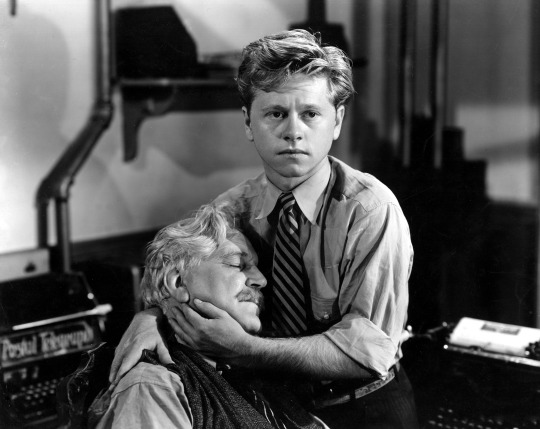
Mickey Rooney’s home studio wanted him to serve his country during World War II … but not in the way that you think. During World War II, Hollywood film studios helped express patriotic ideas through film. This could be through a film on soldiers experiencing military life, depicting Americana or Americans on the World War II homefront making sacrifices for those overseas.
As Metro-Goldwyn-Mayer’s top box-office draw, Rooney was cast in homespun comedies and musicals with wholesome values. Since 1937, Rooney starred in the Andy Hardy film series, where he played a teenager that figured out life, love and turned to his judge father for a “man-to-man talk” when he needed help. In total, there were 15 Andy Hardy films from 1937 to 1946 (and one later in 1958 with Andy Hardy as an adult) and they were hugely successful for the studio.
MGM felt that Rooney’s films, like Andy Hardy, personified American ideals and what servicemen and women were fighting for overseas. At least … that’s what MGM told the draft board.
With the war raging overseas, it was a real possibility that Rooney would be drafted, especially when other MGM contract players enlisted or were drafted. But studio heads wanted to keep Rooney out of the war and in front of film cameras, according to his biographers Richard A. Lertzman and William J. Birnes.

In 1942, Eddie Mannix, MGM executive and “fix it” man, sent formal documents to the local draft board to get Rooney an occupational deferment. Mannix cited the Andy Hardy films and their patriotism and that Rooney would soon begin production on another film important to the American homefront, THE HUMAN COMEDY (’43). Lertzman and Birnes noted that Mannix also stated the main reason MGM didn’t want Rooney in the military: the studio would lose millions.
The appeal was denied, but Rooney received an extension; allowing him to make THE HUMAN COMEDY. Based on a story by William Saroyan and directed by Clarence Brown, THE HUMAN COMEDY is a quiet story that follows an American family, the Macauley’s, during a year of adjustments in the small town of Ithaca. The film is narrated by Mr. Macauley, played by Ray Collins, who died two years prior. The eldest son Marcus (Van Johnson) is drafted. To help support the family, teenaged Homer (Rooney) gets an evening job in the local telegraph office. Homer’s family is rounded out by Ma (Fay Bainter), his sister Bess (Donna Reed) and his five-year-old brother Ulysses (Jackie “Butch” Jenkins).
As Homer gets more comfortable in his job, he matures and feels like everyone around him is changing — when it’s really just that he is growing up. As a telegraph delivery boy, he takes difficult messages to mothers who have lost their sons, and he has the responsibility of looking after alcoholic telegraph operator Willie Grogan, played by Frank Morgan. Everyone around Homer also changes and adapts. Bess and her friend Mary allow three soldiers on furlough to join them at the movies; knowing that soon they will see action on the battlefield. Homer’s boss Tom Spangler and socialite Diana Steed marry — bridging a social class gap and realizing that they are more similar than they think. Even Ulysses starts to learn more about life around him, like what it means to be afraid.

While the entire cast of notables play their roles superbly, Mickey Rooney is the standout performance in THE HUMAN COMEDY, and earned an Academy Award nomination for the role. In many of his other films, Rooney’s characters were variations of his Andy Hardy character. It didn’t matter if Rooney was portraying Huckleberry Finn or putting on a musical show with Judy Garland, shades of Hardy shine through.
But in THE HUMAN COMEDY, he plays the role in a restrained and mature manner. He’s emotional but doesn’t overact. It’s one of Rooney’s best performances. Perhaps because of a warning director Clarence Brown gave him: “The first time you shed an unnecessary tear or start any of the mugging you’re famous for, I’m going to halt everything, walk right out in the middle of the set, and give you a swift kick in the pants.”
Despite the early admonishing, Brown later said that Rooney was one of the greatest film talents and “could do no wrong in his book,” according to Brown’s biographer Gwenda Young. In one scene, Rooney had to emotionally read a telegram and react to the bad news. Brown was amazed that with each take, Rooney would “read it as though he’d seen it for the first time.” Brown and Rooney both later said that THE HUMAN COMEDY was one of the best films they made.

The film also features new talent such as Van Johnson, Donna Reed, Don DeFore, Barry Nelson and Robert Mitchum in his first film role.
Released in March 1943, the film garnered mixed reviews from critics, but ultimately was a success. Critics like Bosley Crowther of the New York Times said it was charming and had “moments of extraordinary beauty” but was also filled with “maudlin gobs of cinematic goo” when it came to some of the sermon-like dialogue. Critics overseas, who were closer to the battlefield, struggled with the message of “all men are angels,” according to Young.
As Rooney was filming THE HUMAN COMEDY, Mannix continued to submit appeals to the draft board from August 1942 to February 1943. Studio physician Dr. Edward Jones even stated that Rooney had a heart flutter, classifying him as 4F — unfit for duty, according to Lertzman and Birnes. Eventually, Rooney was able to serve his country more than in his film roles. Rooney was reclassified as 1A and he was enlisted in the Army in June 1944. Rooney later said he was proud of his service and continued to support veterans and attend World War II veteran ceremonies, including leading the Memorial Day Parade in Washington, D.C. in 2008.
#Mickey Rooney#Birthday#100th birthday#WWII#draft#Van Johnson#Donna Reed#Marsha Hunt#old hollywood#old movies#studio#MGM#TCM#Turner Classic Movies#Jessica Pickens
80 notes
·
View notes
Text
po3 is a weird arc (alpha version)
alpha version bc i want to use that title for like. actual good analysis and not just me ranting.
anyway spoilers for ashes below the cut. like, maybe not major spoilers? but i'm talking about all the fucking bullshit.
okay so like. po3 is a weird arc, in that.
a whole fucking Lot Of Shit happens and also nothing happens. which is frankly impressive.
okay so part of ashes being Much Shorter than even a single warriors book means that i necessarily have to really simplify the plot, because i'm trying to fit six books of content (ca. 500k words, based on my very rough estimates) into a tenth of the space. so i have to be really judicious in picking and choosing what i want to include.
e.g., the whole plot of outcast has been deferred to...honestly? probably won't even cover it in ashes. like, it's going to Happen because i want to get stormfur and brook back home, but it's probably going to b like "they go to the mountains congrats bye."
but okay so. we're in the green cough epidemic that takes place in long shadows, and i'm checking who gets sick, and like.
okay! first thing: why the fuck does it take so long for everyone to become a warrior good god.
anyway this is what i mean, anon asking about po3 and what makes me want to bang my head on a wall, i've read it so much i kind of...smooth over the bad parts.
i haven't properly read it in ages, when i reread warriors to get back into the fandom, straight up, i read the sight, skimmed long shadows, and read part of sunrise, and called it a day.
cause like. i have to have read it 4 or 5 times as a kid. maybe more.
so anyway. obviously i've skipped over a hell of a lot of plot, right? that should be what i'm telling you about. i mean! ashes timeline is like. five or six chapters to cover six months, two chapters to cover the next six, repeat.
but like! no. in fact. it turns out Nothing Happens in dark river. i'm not even kidding, i literally do not remember the name of the second book of my favorite arc without looking it up.
(partially because i have memory problems but also because po3 is a weird arc.)
so anyway. but then. long fucking shadows.
anyone who knows what's what with their warriors timeline knows that i've fucked with it, like, a lot.
(oh also! jaypoppy my beloved like. jay & poppy are such good friends in po3? and then it's just forgotten about? i hate it so much. they're legitimately friends.)
but right! okay so in an effort to...smooth some stuff out, whitewing has her litter Way Early, forcing millie to have her litter even earlier. this is because my first outline of ashes had dove and ivy as leafpool's kits. i cut that, because i didn't like it, and there's not really a reason to. dove isn't part of the po3 prophecy, so like. it doesn't matter. and i didn't want to do that because it kind of...hm. not sure what the best way to describe this is, but the effect it had on the plot i didn't like.
anyway, that was like. my first outline. which was. a lot of things were different. holly didn't have a power, like half of leafpool's litter died, mothwing was more involved (sorry mothwing), and the focus of the entire thing was much more introspective.
so right so. i still needed dovekit alive around the same time as leafpool's litter for. honestly i didn't need her, but i liked the arc i had for her. it's kind of short bc she's not a major character but i liked it a lot.
anyway.
so this has like, so many problems. namely, honeyfern and briarkit. lucky you, honeyfern. you get to live. you're my least favorite sister, so i have mentioned you exactly once. ironically, you're a kind of important to the story. it's okay. poppyfrost also has barely been mentioned and i adore her.
so like? fuck. anyway my frustration has nothing to do with any of that, i'm just setting up. like. i doubt anyone is reading ashes for a rewrite of po3 that stays true to it. obviously i'm...canon is happening, partially, but whether or not you've noticed, i crossed the critical divergence point a long time ago.
but like! you probably didn't because the plot of po3 is so meaningless.
none of it matters, which is why i can cut out all of outcast without anyone batting an eye. it leaves me with one loose thread that i honestly don't have to resolve if i don't want to. luckily for brook, i want to.
but right so! the problem is like. po3 does have a plot. and long shadows has like. finally a plot.
so sol! fucking sol.
see, i like. sol is a good villain, yeah? but...there's.
there's nothing i can do about him. there is literally Not Enough Space in my story for him. and you know fucking what! if he had happened earlier, i would not be having this problem.
but there is straight up Not Enough Space to explain that tawnypelt & co. are here now. like. there just fucking isn't.
also the amount squilf cares is pretty much 0. she's never really gotten to express this in ashes, in part because she's still figuring it out, but from her perspective, tawnypelt was kind of. well. you know what no i do have a line of things i don't want to share because this is a thread i need to develop.
anyway because there literally isn't enough space for the sol arc to happen at the same time as the greencough epidemic i have to push off another major plot element and i hate it and it's po3's fault for having such a wack plot.
5 notes
·
View notes